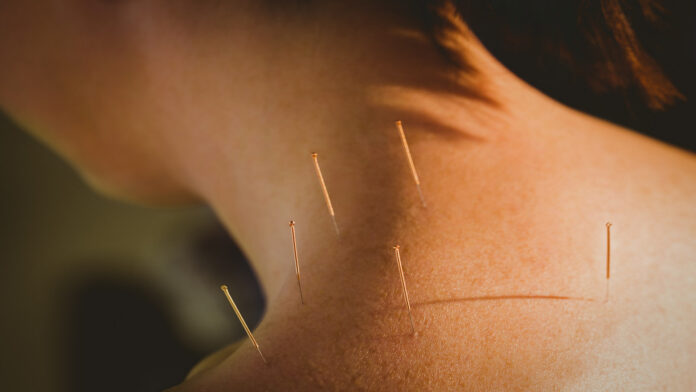Whiplash is a common injury that occurs when the head is rapidly and forcefully thrown forward and then backward. This motion can cause damage to the muscles, ligaments, and other soft tissues in the neck, resulting in pain, stiffness, and reduced range of motion. While conventional treatments like pain medication, physical therapy, and chiropractic care can be effective, some people may seek alternative therapies for whiplash relief. In this article, we’ll explore some of these alternative therapies, including acupuncture, massage, and more.
Acupuncture for Whiplash Relief

Acupuncture is an ancient Chinese practice that involves the insertion of thin needles into specific points on the body to promote healing and relieve pain. While the exact mechanisms by which acupuncture works are not fully understood, it is thought to stimulate the release of natural pain-relieving chemicals like endorphins and serotonin.
Several studies have investigated the use of acupuncture for whiplash relief, with mixed results. However, a review of the existing research published in the journal Evidence-Based Complementary and Alternative Medicine (eCAM) found that acupuncture may be effective in reducing neck pain and improving the range of motion in people with whiplash. The review authors noted that more high-quality studies are needed to confirm these findings.
Massage for Whiplash Relief
Massage therapy involves the manipulation of soft tissues in the body to promote relaxation and relieve pain and tension. There are many different types of massage, but some common techniques used for whiplash relief include deep tissue massage, trigger point therapy, and myofascial release.
One study published in the Journal of Manipulative and Physiological Therapeutics found that massage therapy was effective for reducing pain and improving range of motion in people with chronic neck pain, including those with whiplash-associated disorders. The study authors noted that massage therapy may work by reducing muscle tension and increasing blood flow to the affected area.
Other Alternative Therapies for Whiplash Relief
In addition to acupuncture and massage therapy, there are several other alternative therapies that people may use for whiplash relief. These include chiropractic care, yoga, mind-body therapies, and herbal remedies.
Chiropractic Care

Chiropractic care is a complementary health approach that involves manipulating the spine and other joints to improve function and reduce pain. Some people with whiplash may benefit from chiropractic care, which can help restore proper alignment and reduce tension in the neck and upper back. While some studies have suggested that chiropractic care may be effective for reducing pain and improving function in people with whiplash, other studies have found no significant benefits. It’s important to talk to a healthcare professional to determine if chiropractic care is appropriate for you.
Yoga
Yoga is a mind-body practice that involves physical postures, breathing exercises, and meditation. Some research has suggested that yoga may be effective in reducing pain and improving function in people with chronic neck pain, including those with whiplash-associated disorders. Yoga may help improve flexibility, reduce muscle tension, and promote relaxation. However, more studies are needed to confirm these findings.
Mind-Body Therapies
Mind-body therapies are a group of alternative therapies that focus on the connection between the mind and the body. These therapies aim to promote relaxation, reduce stress, and improve overall health and well-being. Some examples of mind-body therapies include meditation, relaxation techniques, and cognitive-behavioral therapy.
Meditation
Meditation is a practice that involves training the mind to focus on the present moment, often by concentrating on the breath or a particular object. Research has suggested that meditation may be effective in reducing pain and improving function in people with chronic neck pain, including those with whiplash-associated disorders. Meditation can help reduce stress, promote relaxation, and improve mood, which may help people with whiplash cope with their symptoms.
Relaxation Techniques

Relaxation techniques like deep breathing, progressive muscle relaxation, and guided imagery can help reduce muscle tension, promote relaxation and reduce stress. These techniques can be practiced at home and may help manage whiplash-related pain and discomfort.
Cognitive-Behavioral Therapy
Cognitive-behavioral therapy is a type of talk therapy that aims to change negative thoughts and behaviors to improve mental health and well-being. One study published in the Journal of Pain found that cognitive-behavioral therapy was effective in reducing pain and improving function in people with chronic neck pain. Cognitive-behavioral therapy can help people with whiplash manage their pain, reduce stress, and improve their overall quality of life.
Herbal Remedies
Some people may use herbal remedies like arnica or devil’s claw to relieve pain and inflammation associated with whiplash. While some of these remedies may be effective, it’s important to talk to a healthcare professional before using any herbal supplement. Herbal remedies can interact with other medications and may not be safe for everyone. It’s also important to choose high-quality supplements from reputable sources to ensure safety and effectiveness.
Potential Risks and Considerations

While many alternative antidotes for whiplash are considered safe, there are some potential risks and considerations to keep in mind. For example, acupuncture should only be performed by a licensed practitioner using sterile needles to reduce the risk of infection. Massage therapy should only be performed by a qualified massage therapist, and certain techniques like deep tissue massage may not be appropriate for everyone.
Additionally, some alternative treatments may not be covered by insurance, so it’s important to consider the cost of treatment for whiplash before deciding to pursue any particular therapy. It’s also important to talk to a healthcare professional before starting any new treatment, especially if you have any underlying health conditions or are taking medication. They can help you determine if a particular therapy is safe and appropriate for you.
It’s also important to keep in mind that alternative medicines are not a substitute for conventional medical care. If you have whiplash, it’s important to seek medical attention to rule out more serious injuries and to develop an appropriate treatment plan. Alternative therapies can be used in conjunction with conventional treatments to help manage pain and promote healing.
Conclusion
Whiplash is a painful and often debilitating condition that can significantly impact a person’s quality of life. While conventional treatments like pain medication, physical therapy, and chiropractic care can be effective for whiplash relief, some people may seek alternative therapies to manage their symptoms. Acupuncture, massage therapy, chiropractic care, yoga, mind-body therapies, and herbal remedies are just a few of the alternative therapies that may be used for whiplash relief. It’s important to consider the potential risks and benefits of any therapy and to talk to a healthcare professional before starting any new treatment. With the right combination of conventional and alternative therapies, many people with whiplash can find relief from their symptoms and return to their normal activities.





![Calgary’s Hottest Neighborhoods for Luxury Homebuyers [2024]](https://thewashingtonote.com/wp-content/uploads/2024/04/Calgary-324x160.png)



